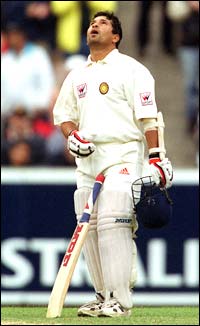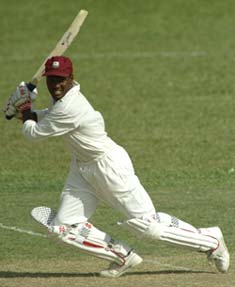Lara vs Sachin
Peter Roebuck
Nothing is more exciting in sport than the sight of champions meeting in the ring. Boxing and wrestling depend upon dramas between the ropes, as the giants of the age exchange blows. Beforehand the experts have their say and the proud combatants have trained to their last ounce of strength in anticipation of the forthcoming conflict. At last the bell tolls and the naked struggle begins, whereupon the mob hoots and hollers, as it has since Roman times, for the smell of blood and sweat, and the sound of bodies suffering has always had a powerful effect, reminding man of his primitive origins.
Cricket is a more cerebral game; a slow-moving contest that depends as much upon the mind as upon the power of the arm. Nonetheless, the prospect of great men brought together has an immense and eternal appeal. Now that Steve Waugh's eyes and feet are slowing, leaving him vulnerable to attacks previously dismissed with a straight bat and a withering stare, there can be no doubt that Sachin Tendulkar and Brian Charles Lara are the batsmen of the age. Inevitably, their duel on the generally impassive pitches of the Caribbean will be closely followed by those interested in the game or attracted by the idea of great forces meeting in conflict like gods drawn to a field and left to their own devices.
 Cricket can count itself fortunate that two such batsmen appeared at the same time; players capable of taking their craft to a level it has seldom touched, turning it almost into an artform as they reach beyond the prosaic and into a privileged place inhabited by a chosen few; where beauty takes many forms and ends in the destruction, swift or slow, of the hewers of bricks and turners of sods called upon to send down cricket balls that presently seem like gifts.
Cricket can count itself fortunate that two such batsmen appeared at the same time; players capable of taking their craft to a level it has seldom touched, turning it almost into an artform as they reach beyond the prosaic and into a privileged place inhabited by a chosen few; where beauty takes many forms and ends in the destruction, swift or slow, of the hewers of bricks and turners of sods called upon to send down cricket balls that presently seem like gifts.
Of course, Tendulkar and Lara will not actually exchange blows, for cricket is not a simple game. Instead, they are merely members of a team and called upon to play roles and pursue tactics determined by the collective. Neither man is leading his team, a task that has proved beyond them as they tried in vain to inspire and succeeded only in reducing themselves. Lara, the quixotic son of Trinidad, and Tendulkar, from the Mumbai hothouse, must stand in the slips as their rival wields his willow, suffering almost silently as loose deliveries are despatched, and secretly celebrating as the champion falls. Both men will point out that cricket rises above the individual or is not worth a paisa. Yet they know the unavoidable truth, that a day of measurement has come and can no more be avoided than an appointment with the dentist.
Not that the issue is in doubt. Tendulkar is the batsman of this age. Don Bradman was right about that, as about so many things. Lara is the genius with his head in the clouds, and Tendulkar, the master with his feet on the ground. Lara can hit almost any ball to the boundary and has played some of the most sublime innings the game has known. His centuries against Australia, on his own patch, and his recent performances in Sri Lanka had about them the unmistakable aura of brilliance. Indeed, they were unforgettable contributions to the story of batsmanship and confirmed that the little, lightly framed left-hander with a wand in his hands is also a spirited competitor when the mood takes.
 These innings, though, were remarkable partly because they came between long arid short spells during which Lara scarcely contributed at all and sometimes seemed hardly to care. These periods, too, must be taken into account, for consistency has its part to play in all of this; the ability to write or sing or bat well time and again, and not only when the mind is willing. Lara has often let his team down and, despite the recent surge, his tale has been as much about failure as success. His method, too, has been unreliable and contained weaknesses superbly exploited by Glenn McGrath. At last, Lara has lowered and straightened his backlift, a change he did not make till it was recommended by an even greater cricketer, the best of them all, Sir Garfield Sobers. Pride played its part in Lara's long cricketing winter, as did immaturity.
These innings, though, were remarkable partly because they came between long arid short spells during which Lara scarcely contributed at all and sometimes seemed hardly to care. These periods, too, must be taken into account, for consistency has its part to play in all of this; the ability to write or sing or bat well time and again, and not only when the mind is willing. Lara has often let his team down and, despite the recent surge, his tale has been as much about failure as success. His method, too, has been unreliable and contained weaknesses superbly exploited by Glenn McGrath. At last, Lara has lowered and straightened his backlift, a change he did not make till it was recommended by an even greater cricketer, the best of them all, Sir Garfield Sobers. Pride played its part in Lara's long cricketing winter, as did immaturity.
By contrast, Tendulkar has served his team and his country magnificently throughout a long and unblemished career, though that silly Mike Denness did his best to tarnish his reputation. Tendulkar has managed to carry the hopes of a team and an entire nation and has still batted superbly and behaved gracefully. He is a master of his craft and a man so committed to his side that he wants to bowl, talk, appeal, advise and urge, sometimes altogether. Of course, he is not perfect, a fate yet to befall any sportsman, and his technique and concentration occasionally falter. But he, too, has played some of the great innings of the age, in England and Australia, on unfamiliar pitches and under intense pressure. Nor has he ever forgotten it is only a game and he is only a man.
Lara will be remembered for his incredible innings and bursts of scoring whilst the Indian's entire career will be treasured. But it is not over yet and these fine and contrasting cricketers have many more innings to play before a final assessment can be made of their standing in the game. Meanwhile, it is a matter of appreciating their outstanding work. It is possible that both will be seen to advantage this month, in which case comparisons will seem irrelevant as the game soars. In the end, there is room for both of them, and anyone else capable of performing and entertaining at the same time. These men take the practice of run-scoring and add their own strokes of genius. Their contributions are limited only by temperament and the game itself; a game that likes to recapture the lost soul and bring down the spirit that has flown too high. Lara has flown near the sun; Tendulkar has contented himself with basking in its glory.
More Columns
Mail Peter Roebuck